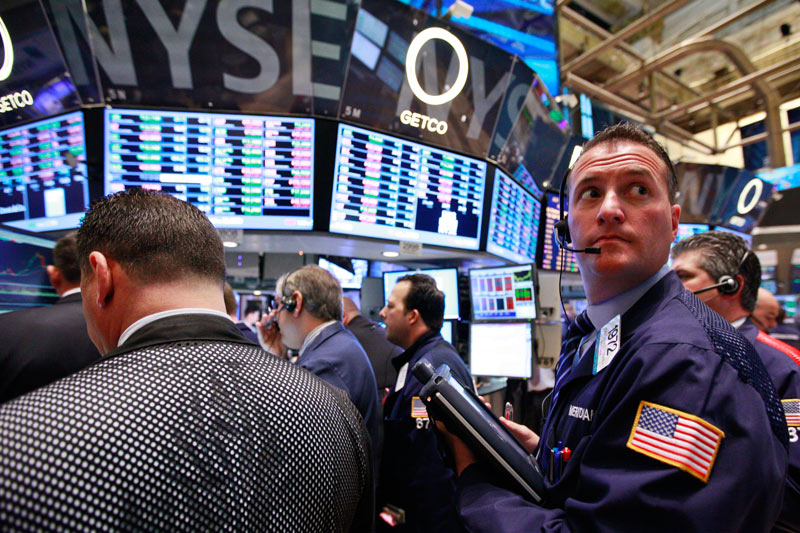Investing.com - U.S. stocks finished higher on Monday after investors digested a flurry of often contradicting economic indicators and concluded that rising home prices and orders for durable goods pointed to a strengthening U.S. economy.
At the close of U.S. trading, the Dow Jones Industrial Average finished up 0.77%, the S&P 500 index ended up 0.78%, while the Nasdaq Composite index gained 0.53%.
U.S. economic indicators released earlier sent mixed signals to the market, though as the day wore on, investors concluded the numbers pointed to an improving U.S. economy.
The Conference Board reported earlier that its index of consumer confidence fell unexpectedly in March, dropping to 59.7 from February's 68.0 reading.
Analysts were expecting the index to remain unchanged in March.
Meanwhile, the U.S. Census Bureau reported that new home sales in the U.S. came in at 411,000 in February, missing expectations for a gain of 422,000 units and well below a 431,000 rise in January.
Home prices, however, continue to improve, and drove stock prices higher.
The Standard & Poor's/Case Shiller composite 20-city home price index rose by 8.1% in January after gaining 6.8% in December, beating expectations for a rise by 7.9%.
Also in the U.S., the Census Bureau said that U.S. core durable goods orders fell 0.5% in February from January, defying expectations for a 0.5% rise and well below a 2.9% increase the previous month.
However, overall durable goods orders, which include transportation items, jumped up 5.7% last month, well beyond market calls for a 3.8% increase, following a 3.8% decline in January, which served as a key market driver during Tuesday trading.
Meanwhile, investors began to look past Cyprus's EUR10 billion rescue package arranged by its European neighbors and the International Monetary Fund, which called for the closure of the country's second-largest lender, Laiki Bank.
The bailout deal guaranteed that accounts holding EUR100,000 or less will continue to be insured and likely moved to another financial institution, though the fates of larger accounts remained up in the air, with depositors and bondholders facing haircuts.
Still, investors concluded Tuesday that since the eurozone remains unified and free of messy defaults on its horizon, U.S. stocks remained an attractive investment choice, especially due to their valuations and to improving fundamentals in the U.S. economy.
Leading Dow Jones Industrial Average performers included Intel, up 2.88%, Hewlett-Packard, up 2.34%, and Boeing, up 2.10%.
The Dow Jones Industrial Average's worst performers included Bank of America, down 0.89%, General Electric, down 0.47%, and DuPont, down 0.31%.
European indices, meanwhile, finished largely higher.
After the close of European trade, the EURO STOXX 50 fell 0.31%, France's CAC 40 rose 0.55%, while Germany's DAX 30 finished up 0.11%. Meanwhile, in the U.K. the FTSE 100 finished up 0.33%.
On Wednesday, the U.S. is to produce industry data in pending home sales and a government report on crude oil stockpiles.
At the close of U.S. trading, the Dow Jones Industrial Average finished up 0.77%, the S&P 500 index ended up 0.78%, while the Nasdaq Composite index gained 0.53%.
U.S. economic indicators released earlier sent mixed signals to the market, though as the day wore on, investors concluded the numbers pointed to an improving U.S. economy.
The Conference Board reported earlier that its index of consumer confidence fell unexpectedly in March, dropping to 59.7 from February's 68.0 reading.
Analysts were expecting the index to remain unchanged in March.
Meanwhile, the U.S. Census Bureau reported that new home sales in the U.S. came in at 411,000 in February, missing expectations for a gain of 422,000 units and well below a 431,000 rise in January.
Home prices, however, continue to improve, and drove stock prices higher.
The Standard & Poor's/Case Shiller composite 20-city home price index rose by 8.1% in January after gaining 6.8% in December, beating expectations for a rise by 7.9%.
Also in the U.S., the Census Bureau said that U.S. core durable goods orders fell 0.5% in February from January, defying expectations for a 0.5% rise and well below a 2.9% increase the previous month.
However, overall durable goods orders, which include transportation items, jumped up 5.7% last month, well beyond market calls for a 3.8% increase, following a 3.8% decline in January, which served as a key market driver during Tuesday trading.
Meanwhile, investors began to look past Cyprus's EUR10 billion rescue package arranged by its European neighbors and the International Monetary Fund, which called for the closure of the country's second-largest lender, Laiki Bank.
The bailout deal guaranteed that accounts holding EUR100,000 or less will continue to be insured and likely moved to another financial institution, though the fates of larger accounts remained up in the air, with depositors and bondholders facing haircuts.
Still, investors concluded Tuesday that since the eurozone remains unified and free of messy defaults on its horizon, U.S. stocks remained an attractive investment choice, especially due to their valuations and to improving fundamentals in the U.S. economy.
Leading Dow Jones Industrial Average performers included Intel, up 2.88%, Hewlett-Packard, up 2.34%, and Boeing, up 2.10%.
The Dow Jones Industrial Average's worst performers included Bank of America, down 0.89%, General Electric, down 0.47%, and DuPont, down 0.31%.
European indices, meanwhile, finished largely higher.
After the close of European trade, the EURO STOXX 50 fell 0.31%, France's CAC 40 rose 0.55%, while Germany's DAX 30 finished up 0.11%. Meanwhile, in the U.K. the FTSE 100 finished up 0.33%.
On Wednesday, the U.S. is to produce industry data in pending home sales and a government report on crude oil stockpiles.
